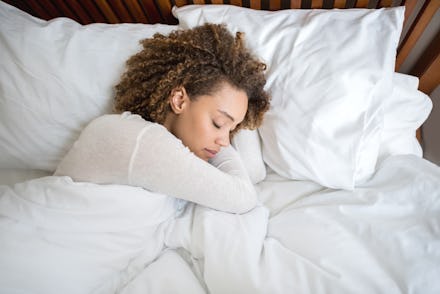Does magnesium really help you sleep? An expert weighs in

I suspect that I inherited my sleep struggles from my mom. Both of us take ages to doze off, and often wake up a few times throughout the night. Recently, she told me she’s been sleeping better since she started taking magnesium supplements. As a light sleeper, I perked up — but as a health reporter well aware of the hype that pervades the supplement industry, I was also wary. Can magnesium really help you sleep?
Magnesium is an essential nutrient involved in a plethora of crucial biochemical processes, from DNA and protein synthesis, to nerve and muscle function, per the National Institutes of Health Office of Dietary Supplements. According to the National Sleep Foundation, some studies report that it increases levels of gamma-Aminobutyric acid, or GABA — a neurotransmitter that relaxes your mind and helps you drift off to dreamland — in your brain.
But whether magnesium actually promotes sleep remains unclear. The amount of scientific evidence is “close to none,” David Neubauer, a sleep medicine specialist at the Johns Hopkins Sleep Center, tells Mic.
Two studies tend to crop up in the blog posts, articles and other materials supporting magnesium as a sleep aid, Neubauer says. One is a small 2012 study that randomly assigned 46 older adults to take either magnesium or a placebo every day for eight weeks. They completed a measurement of sleep quality called the insomnia severity index (ISI) — the higher the score, the more severe their insomnia — as well as a sleep log, before and after treatment.
The magnesium group showed statistically, but not clinically, significant decreases in their ISI scores and the time they took to fall asleep, Neubauer explains. Their ISI scores dropped by only around two points, and the time they took to fall asleep by only about 12 minutes, from 1.3 hours to 1.1 hours. In other words, they still took more than an hour to doze off.
Proponents of magnesium’s supposed soporific properties also often cite a very small 2002 study, Neubauer says, which examined 12 healthy seniors who stayed in a sleep lab and took magnesium and a placebo for 20 days each. Magnesium led to a significant increase in slow wave sleep, or deep sleep, in participants who took it. But the study was designed to determine whether magnesium reverses the decrease in slow wave sleep and other changes that occur with aging, not whether it can improve sleep, so we can’t use it to conclude that magnesium can help you sleep better, Neubauer says.
Indeed, the researchers didn't assess sleep quality, and although the participants fell asleep faster and slept longer when they took magnesium (19 minutes versus 35 minutes, and 336 minutes versus 326 minutes, respectively), the results weren't statistically significant.
Other studies have shown that combinations of magnesium with other purported sleep-promoting supplements, like melatonin and zinc can benefit people with insomnia, but it’s hard to tease apart how much magnesium contributed to these improvements compared to the other supplements, Neubauer says.
That said, it’s still possible that magnesium can improve sleep quality. “I’m not saying magnesium doesn’t help with sleep,” Neubauer says, “but there is no convincing evidence out there [that it does].” This is just another one of those cases where, if it seems to work for you, there's no harm in taking it in moderation.
The good news is, we all need magnesium, he says. The NIH Office of Dietary Supplements lists recommended daily amounts, which range from around 300 to 400 milligrams for adults, and vary depending on your age and sex, and whether you’re pregnant or breastfeeding. “Food is the best way to get it,” according to Neubauer — nuts, whole grains, and leafy greens contain plenty, per the NIH. Taking magnesium as a supplement is probably safe as long as you stick to the amounts listed on the label, Neubauer says. Just don’t count on it to help you fall asleep.
As someone who’s tried all manner of sleep remedies, from melatonin to weed, but to no avail, I’d love to find a pill that makes me snooze like a baby. I wish magnesium were it, but this may be just another supplement for which the enthusiasm outweighs the evidence.